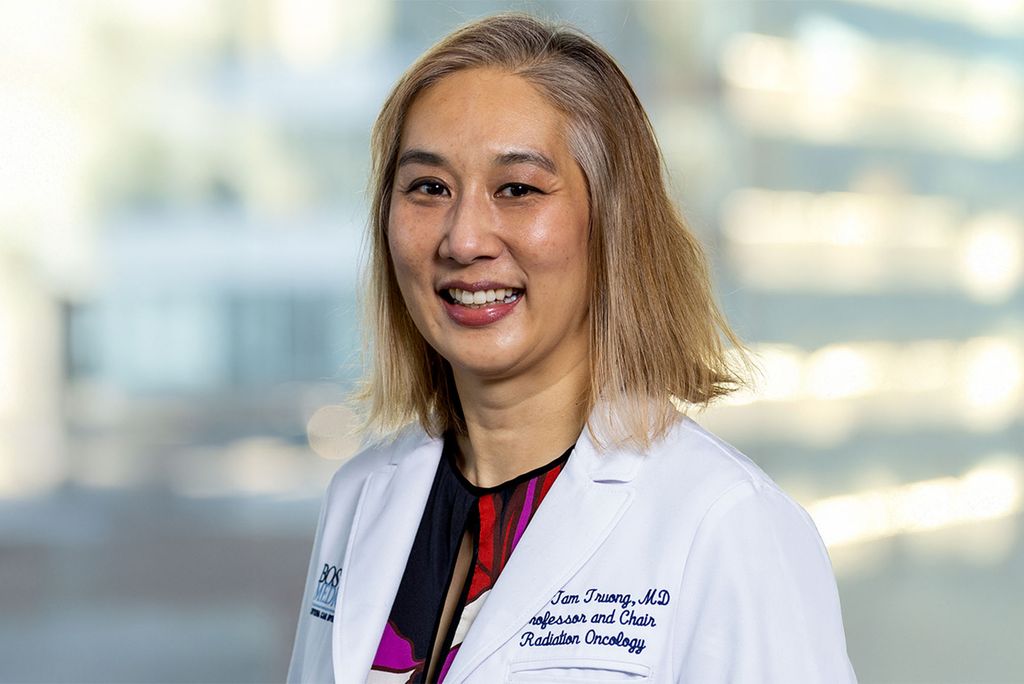“We talked a lot on concentration, memory, and follow-through,” says Cameron, who is now in remission. “We used tools like lists, charts, goal-setting to break down tasks into more manageable pieces. This let us continue to be involved in all of the parts of our lives that we were involved in prior to diagnosis, whether that was managing family life, daily expectations and stresses, and activities of life.”
Cameron recalls one particular task that felt overwhelming: cleaning out the family closet. She didn’t feel like she had the focus or energy to tackle it all at once. But Newman suggested she break it down into smaller daily tasks, setting a 15-minute timer for each. For example, Monday might focus on one shelf, and Tuesday would be for hanging shirts.
Robin Newman, a Sargent College clinical associate professor of occupational therapy, studies how cancer affects daily functioning and quality of life. Photo by Jackie Ricciardi “Learning these coping, self-help, and management skills helped me be a better parent,” Cameron says. “The stress I was feeling about managing the household could have impacted my mood and ability to be with my kids—I would be frustrated. But by using her strategies, I felt more successful managing the stresses, and more patient and present for my kids. The skills I learned have been a huge part of what has carried me through the last seven to eight years.”
As an occupational therapist, Newman researches how cancer affects daily functioning and quality of life, particularly for parents with cancer.
“It’s always been an interest area of mine, in part because the age of survivors is younger and younger now,” says Newman. “People have these really rich, active lives that are interrupted by this cancer experience. You’re a cancer patient, but you have these dual roles—you’re a mother, a father, a guardian to these children in your home. These parents are not just tired, they are cognitively and physically tired.”
During the pandemic, Newman invited dozens of parents with cancer to document their lives through photography. Participants captured images of what it looked like to parent through treatment. Occupational therapy students from Sargent and photography students, working under Toni Pepe, a BU College of Fine Arts associate professor of art, analyzed over 100 images through clinical and artistic perspectives.
The result was Art & Care: Living with & Beyond Cancer ,
“It was really beautiful because it showed us what mattered to parents: the meaning behind spending time with your kids, how they worked to balance it all, the emotional aspects, and moving forward beyond a cancer diagnosis,” Newman says. “I’ve been working with people with cancer for a couple of decades, and this is the most meaningful project I’ve ever done.”
“It was really beautiful because it showed us what mattered to parents: the meaning behind spending time with your kids, how they worked to balance it all, the emotional aspects, and moving forward beyond a cancer diagnosis.”
Robin Newman Looking ahead, Newman wants to focus on another key issue: the loneliness and social isolation many parents experience in the year following active cancer treatment. She is working on a new project with Dan Fulford , a BU associate professor of occupational therapy and of psychological and brain sciences, that will ask people to answer questions on a mobile app about how often they are connecting with others, the quality of those interactions, and if they are experiencing loneliness throughout the day.
“Cancer can be isolating to any patient at the onset of their diagnosis, but when you’re younger and have a family and the stressors that go along with that, what does that look like?” Newman asks.
Anecdotally, parents have told Newman that they crave support and resources, especially around how to communicate with and support their children.
“They want to know how to stay connected, and maintain some sense of normalcy in their homes,” Newman says. “How do you talk to your kids when you have cancer? How do you help them to appreciate what is happening? How do you maintain a connection when a child might see a parent and be scared by what they are seeing?”
Newman says she dreams of a “parenting portal”—a virtual hub where parents can access tailored resources and expert support on their own schedule. Cancer patients are often inundated with information and resources all at once, she says, and the portal would allow them to access what they need when they’re ready for it.
As an occupational therapist, Newman views her role as helping people reclaim their everyday lives, establish healthy routines, and resume activities that matter most to them. “Our lens really helps us understand the challenges that people experience, how to address those challenges, and how to infuse them into the activities that people want to do,” she says.
Close

